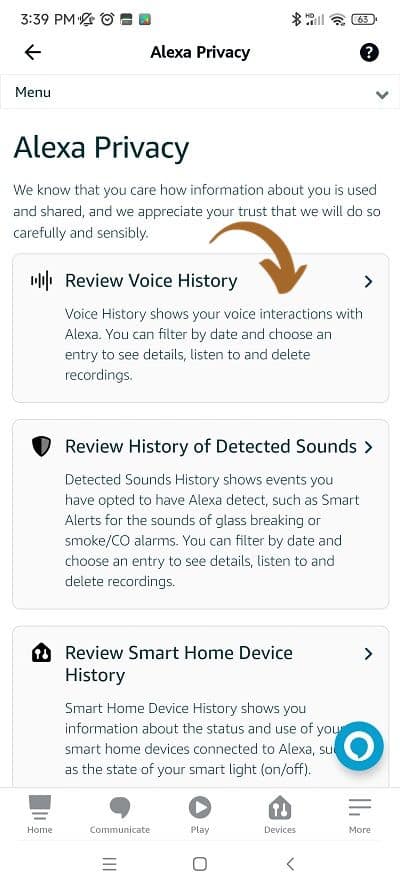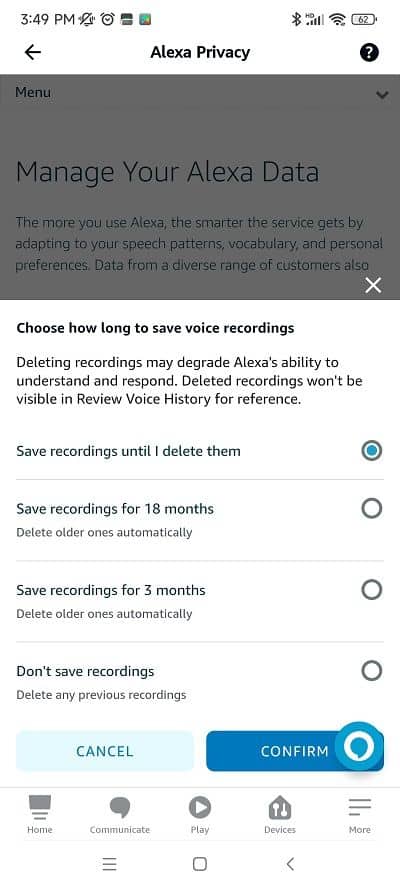
Alexa is this cool little gadget that listens to you and helps manage tasks around the home. Overall, it has changed how we interact with the environment.
But here’s the kicker: I started wondering, is this thing recording all my off-key shower singing and those secret midnight fridge raids?
Digging into it, I found out that Alexa record audio with a digital memory. It remembers bits of what you say to get better at its job—like a personal assistant who wants a gold star. Amazon’s not leaving us high and dry; they’ve got dedicated settings. You can peek at what Alexa hears, delete those audio clips, and tweak those privacy settings.
Armed with the know-how, anyone can tweak their Alexa to be more discreet, and here is how.
Can Alexa Record Audio Conversations Without Your Knowledge?
Have you ever wondered if your Alexa is eavesdropping on your chats?
Or maybe you’re curious if it’s recording everything you say, like a spy?
Here’s the scoop: Alexa’s always got her ears on. She’s not recording your every word, but she’s definitely on the lookout for her name. Say “Alexa,” and she starts recording what comes next, sending it to the cloud.
Sometimes, Alexa might get confused and think she heard her name when you didn’t call her. It’s rare, but it certainly happened to me; it shows that voice assistants aren’t perfect.
The thing is, Alexa records some of your conversations because it helps her get to know you better. That way, when you talk to her, she can be more helpful and in tune with your needs.
Sure, it’s a bit of give and take, but isn’t that the case with most techy stuff?
Where Does Alexa Record Conversations?
Alexa devices are designed to listen for the “wake word” before recording—Amazon stores voice recordings regularly on its cloud servers. The microphone can be turned off to prevent any accidental recording.
Users can review voice history and delete recordings in the Alexa app:
- Open the Amazon Alexa App on your phone and select More

- In Settings, find Alexa Privacy and click on it.

- Choose Review Voice History and browse the recordings.

You can look into your history with Alexa and see all your chats there. And if you ever feel like some of those conversations need to go, you can delete them individually or clear the whole batch in one go.
Who Can Listen To Your Conversations?
Who can get their hands on your Alexa recordings because, let’s face it, that’s a big privacy worry for many of us. So, here’s the deal:
-
User Access: Only you can access your voice recordings directly through your linked Amazon account.
-
Amazon Employees: Some recordings may be reviewed by Amazon employees to improve Alexa’s voice recognition technology.
-
Third-Party Apps: If enabled, third-party apps may have access to recordings generated through their skills, but Amazon’s policies strictly regulate this.
-
Privacy Protections: Amazon provides several layers of privacy protection to safeguard recordings and minimize unauthorized access.
Alexa devices have settings allowing me to manage recordings and privacy, ensuring that I control and protect my private conversations. However, one needs to be made aware of their existence to be able to manage and use them properly.
Can You Stop Alexa From Saving Conversations?
Yes, I can prevent Alexa from saving my voice recordings.
- Replicate the steps above to locate Alexa Privacy, and select Manage Your Alexa Data.

- Inside Manage Your Alexa Data, select Voice Recordings.

- From there, you can adjust how long Amazon saves voice recordings or choose not to save them.

Other Ways To Delete My Alexa Recordings
To delete my voice recordings, there are a few methods I can use:
-
Deletion by Voice: I can tell my Amazon Echo device, “Alexa, delete everything I said today,” to erase the day’s interactions. As long as this is enabled in settings.
-
Amazon’s Website: I can also delete my voice history through Amazon’s Privacy Hub on the internet.
Can Alexa be Used to Spy on Someone?
Yeah, Alexa devices are all about making staying in touch with your family and friends easy. But here’s the thing: sometimes, people might get the wrong idea about smart devices and try to use these features to snoop on others.
With Alexa’s “drop-in” feature, that’s like a walkie-talkie for your home. It lets you pop into a voice chat with another Alexa device. It’s handy for calling kids for lunch or telling your buddy you’re outside waiting.
But you need permission to access other devices. The first time you let someone drop in, they’re set to do it again whenever they want—no need to ask again.
And that is how someone could get sneaky and use Alexa to keep tabs on you. They need that initial thumbs-up and can let Amazon Alexa listen whenever they want.
Spying Using Alexa Is Not Easy
First off, Alexa’s not sneaky about it. Drop in on someone, and their device will chime and light up, tipping off anyone nearby. So, unless you’re out of the room or have headphones on, you’ll know someone’s Alexa listening or watching.
And remember, you can’t just drop in on any Alexa device. You need that initial access: no permission, voice commands, or drop-in. The permission can also be revoked if it’s not used anymore.
Plus, Alexa has this ‘do not disturb’ mode. Click that button, and you’re off the grid. No drop-ins, no interruptions.
And here’s the kicker: drop-in is like a two-way mirror. If someone drops in on you, they’re also opening up their end of the line. You can also listen to them unless they mute themselves or kill their microphone button or camera. So, if they’re trying to be quiet about it, they’d better remember to keep it on the down-low on their end, too.
Preventing Alexa From Spying
If you’re feeling a bit uneasy about your privacy with Amazon Alexa around, there are some solid steps you can take to keep things on the down-low:
-
Voice Recording Settings: Go to the Alexa app and the privacy settings. Here, you can review and delete your voice data. You can also turn off the setting that uses your voice recordings to improve Alexa’s understanding of your speech patterns.
-
Microphone Control: You can manually mute the microphones on your Alexa device when it’s not in use, preventing accidental recording.
-
Regular Monitoring: Regularly check your account for unexpected activity. Keep track of devices connected to your account and review what was accessed and when to ensure there’s no odd behaviour.
Frequently Asked Questions
How can I determine if my Alexa device is actively recording?
You can tell if your Alexa device is recording by checking for a visual signal.
When Alexa records, the device’s light ring turns blue, indicating that your voice input is being processed. Additionally, you can review voice history in the Alexa app to see past recordings.
What is Alexa’s audio recording duration after the activation word is spoken?
Once activated, Alexa only records your voice for the duration of your request. Typically, this is a few seconds, as Alexa aims to capture only your command or question after the wake word is detected.
Is it possible for Alexa to capture private conversations inadvertently?
Yes, Alexa might unintentionally record private conversations if it mistakes another word or sound for its wake word. These recordings are generally unplanned due to the device misinterpreting background noise.
Can Alexa be used to record and store audio for later review?
Alexa has no feature to record conversations continuously or make selected recordings deliberately for later review. However, individual recordings prompted by wake words can be replayed and reviewed within the Alexa app until the user deletes them.
Are the recordings made by Alexa accessible for personal review?
You can access and review your Alexa voice recordings through the Alexa app. These recordings can also be deleted manually if you choose to do so for privacy reasons.
In what circumstances have Alexa recordings been admissible as evidence in court?
Alexa recordings have been used as evidence in legal cases where the audio captured was relevant to the investigation. In such situations, law enforcement may request access to audio recordings with a valid legal process, such as a subpoena or search warrant.
Daniel Barczak
Daniel Barczak is a software developer with a solid 9-year track record in the industry. Outside the office, Daniel is passionate about home automation. He dedicates his free time to tinkering with the latest smart home technologies and engaging in DIY projects that enhance and automate the functionality of living spaces, reflecting his enthusiasm and passion for smart home solutions.


Leave a Reply